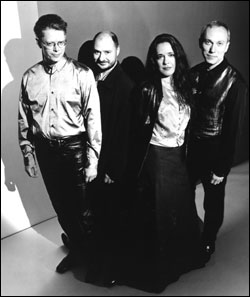1. Most Fun for a Quarter: Trimpin’s “Klavier Nonette”
This installation at Jack Straw Studios had nine toy pianos electromechanically driven to play music from Cage to Liberace, including pieces by 20 local composers. For a quarter, you could dial up the bonbon of your choice and be surreally, charm- ingly engulfed in tinkling.
2. Most Tasteful After-Concert Reception: Sound Currents
After its February and October concerts, this consortium of four composers served waffles, preserves, and real maple syrupthe whole bit.
3. Best Operatic Chemistry: Heather Parker and Sebastian Catana
As Musetta and Marcello in La Boh譥, staged in April by Seattle Opera’s Young Artists Program, the two singers combined contradictionsshe irresistibly coquettish yet steel-willed, he smolderingly temperamental yet vulnerableinto a sizzling, soaring portrayal of two people who can’t live with or without each other.
4. Most Successful Re-creation: Portsmouth Sinfonia
Founded by composer Gavin Bryars and active from 1970 to 1982, the original Portsmouth Sinfonia was made up mostly of people who couldn’t play their instruments. They turned classical and pop faves”Bridge Over Troubled Water,” the 1812 Overtureinto twisted and smeared sound masses, the aural equivalents of melting Dal��locks. Students, faculty, and friends of the UW School of Music re-created this infamous sound-art experiment on May 27, with results equally hilarious and fascinating.
5. Biggest Letdown: The Kronos Quartet
Maybe my hopes were too high when they brought Terry Riley’s 90-minute, 10-movement Sun Rings for quartet, choir, and “plasma wave sounds” (recorded in outer space by the Voyager craft) to the UW’s Summer Arts Festival. But all that’s stayed with me is a misty memory of some pretty sounds and graphics and a long, lovely doze on a July evening.
6. Most Spectacular Special Effect: Parsifal
Seattle Opera’s inaugural performance of Parsifal showed off more than McCaw Hall’s first-rate acoustics: When villain Klingsor was defeated, his four-story-high fortress tower plunged out of sight in seconds, thanks to the stage’s new lift. An audible gasp from the audience nearly drowned out Wagner’s orchestral climax.
7. Best Evening in Ballard: Matt Haimovitz
After his two successful Bach recitals last year, this cellist again sold out the Tractor Tavern with a program of contemporary composers: Tod Machover, Osvaldo Golijov, and several others. Haimovitz played (superbly); the audience was focused, enthralled, and dead silent. Churches have their charms, but Seattle classical concert presenters could stand to think outside the box, and maybe pull in some new listeners while they’re at it.
8. Best Second Chance: Mourning Becomes Electra
After the 1967 Met premiere of Marvin David Levy’s operatic adaptation of Mourning Becomes Electra, the work was all but forgotten. But Seattle Opera’s October production of this throbbing, epic, Civil War-era melodrama proved a smash. If ever there was an argument for Seattle Opera looking outside the standard repertory, this was it.
9. Keenest Loss to Seattle: David Tonkonogui
As a busy chamber musician, most often with the Bridge Ensemble, the cellist helped make some of the most impassioned performances I’ve ever heard, especially in works by contemporary Russians close to his heart like Shostakovich or Schnittke. He also contributed significantly to the distinction of the Seattle Symphony’s cello section. His death on Oct. 28, at 45, of a blood disease left a hole in the local music scene that will not be easily filled.







